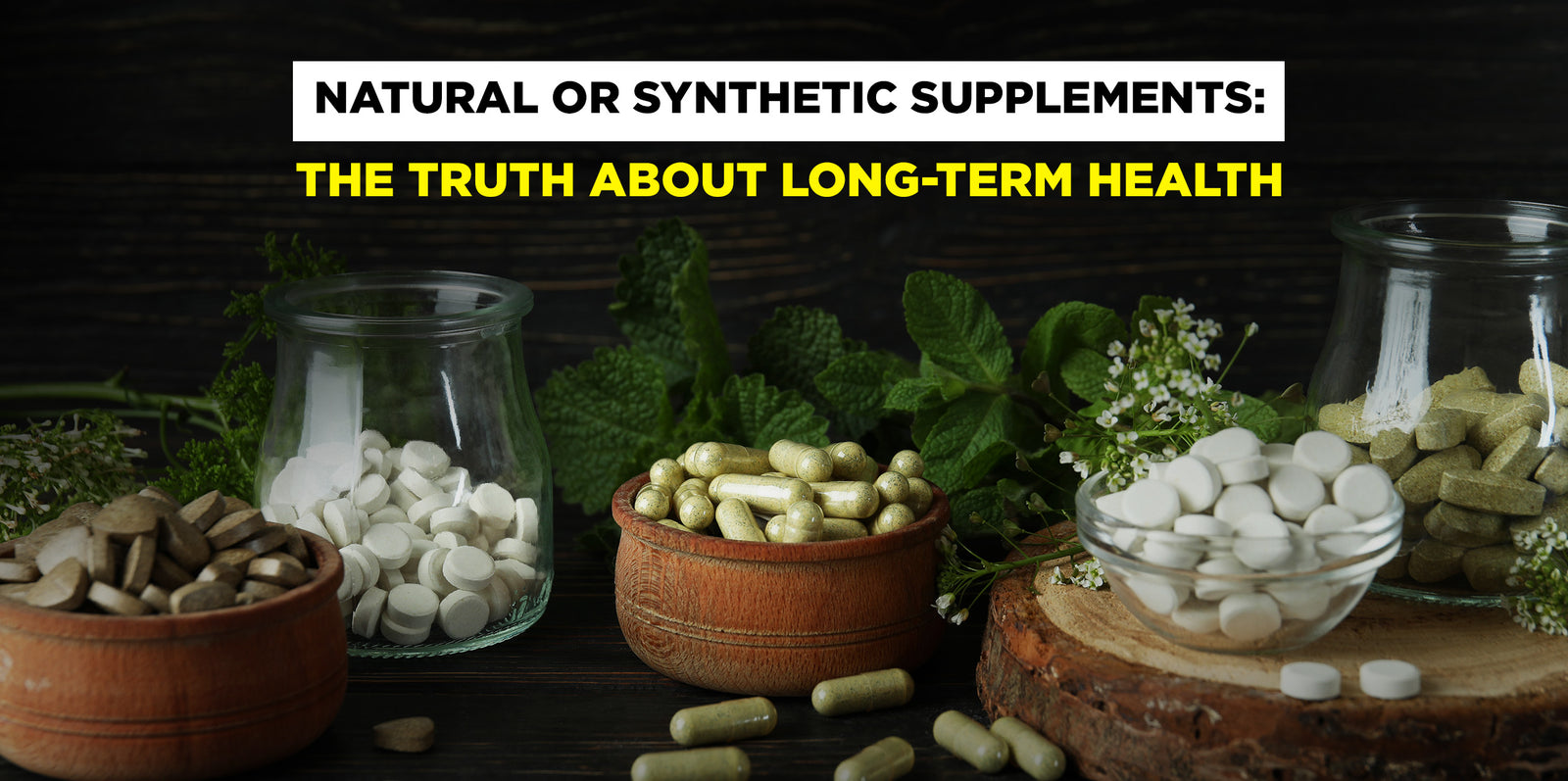Are you overwhelmed by the plethora of supplements coming up on the market today? Natural Supplements, organic, Synthetic Supplements -the options seem to go on forever, and the promises seem great. But when it comes to long-term health, is there a winner between Natural Supplements and Synthetic Supplements? Let's dive deep into this critical conversation and separate fact from fiction.
What Are Natural and Synthetic Supplements?
Natural Supplements
These supplements are directly derived from whole foods, plants, or animals. With this kind of supplement, there is minimal processing, trying to retain the nutrient profile close to its original form. Some examples include fish oil capsules, Isolated whey Protein, or vitamin C sourced from acerola cherries. These supplements would boast labels like "organic," "whole-food-based," or "plant-derived" and are usually well-liked by people preferring a more holistic approach to nutrition.
Synthetic Supplements
Synthetic Supplements are produced in the laboratory through a chemical process mimicking the configuration of natural compounds. They can be partial to fully artificial, for example, vitamin C is repaired from the ascorbic acid manufactured in a laboratory rather than being derived from citrus fruits. Synthetic Products often come at cheaper prices and usually come very concentrated giving a very standardized dosage of supplement needed.
Natural And Synthetic Supplements Advantages: Advantages Associated With Synthetic Supplements
Bioavailability: The Bioavailability Associated With Natural Supplements
The Bioavailability associated with Natural Supplements is highly potent, meaning your body assimilates it highly.
More Complete Nutrient Profile
Whole foods can contain more cofactors with enzymes or phytonutrients to increase their absorptive ability. Not as likely to add non-beneficial extras: Natural Supplements often possess fewer artificial fillers, dyes, and other unnatural additionals.
Benefits of Synthetic Supplements
Uniformity
- The Synthetic Supplements arrive with a fixed dose in every serving. Therefore, this way the amount of nutrients received can be uniform.
Accessibility
- More affordable and much more available to be sure, thus making it a better choice for the general public.
Specific Formulas
- Some just cannot be consumed from the food at that necessary level. Due to this fact, it most often turns out to be more convenient through Synthetic Products.
The Real Deal: Separating Fact from Fiction
Myth #1: Natural Is Always Better
Natural Supplements do offer a whole-food-based profile. However, they are not necessarily better. Soil quality, processing, and even the type of plant or animal used can all impact the quality of Natural Supplements. Some natural sources contain contaminants like heavy metals or pesticides if they are not carefully sourced.
Myth #2: Synthetic Supplements Are Ineffective
Many people view Synthetic Supplements as "fakes" or ineffective, which is not entirely true. Several studies have shown that Synthetic Vitamins and minerals could be just as effective as natural ones in treating deficiencies depending on how they were produced and if they mimicked the nutrient's natural form.
Source and Production Differences Between Natural and Synthetic Supplements
Natural Supplements: Extracted From Plants or Animals and Minimally Processed
- Natural Supplements are extracted from plants or animals and minimally processed.
Synthetic Supplements: These Are Produced in a Lab Using Chemical Processing
- Synthetic Supplements are produced in a lab using chemical processing.
Absorption and Effectiveness
Natural Supplements: They Are More Readily Absorbed by the Body Due to Their Intricate Matrix of Nutrients
- Natural Supplements are more readily absorbed by the body due to their intricate matrix of nutrients.
Synthetic Supplements: They Provide a Precise Amount, but Sometimes, They Can Be Hard for the Body to Break Down
- Synthetic Supplements provide a precise amount, but sometimes, they can be hard for the body to break down.
Fillers and Additives
Natural Supplements: Typically Fewer Artificial Ingredients and Fillers
- Natural Supplements typically have fewer artificial ingredients and fillers.
Synthetic Supplements: May Contain Binders, Fillers, and Artificial Coloring to Make It Last Longer or to Look Better
- Synthetic Supplements may contain binders, fillers, and artificial colouring to make it last longer or look better.
Which One Is Right for You?
The choice between Natural Supplements and Synthetic Supplements would depend on several factors such as dietary restrictions, budget, health goals, and personal preferences. Here's a quick guide to help you decide:
If you follow a holistic, plant-based diet: Natural Supplements would probably be the better choice. If you want nutrients at the right dose promptly and reasonably: Synthetic Supplements are your best shot. If you have a serious health issue: you are better off consulting your doctor or physician as he or she can suggest to you what kind of supplement will work well with your condition. After all, Natural Supplements and Synthetic Supplements each have their pros and cons. Natural Supplements are more like nutrients found in whole foods: they are absorbed better and have fewer additives. Synthetic Supplements are less expensive and consistent, which is a boon for specific deficiencies. What is most important, though, is choosing quality whether you choose to go natural or synthetic. Opt for a reputable brand that has third-party testing and whose sourcing is transparent.
Remember, Supplements are not substitutes for a healthy diet. They may complement, not replace a healthy lifestyle. It is upon the combination of Nutrition and Exercise, sleep, mindfulness, and others that produce long-term health, though supplementation is only part of that whole.


